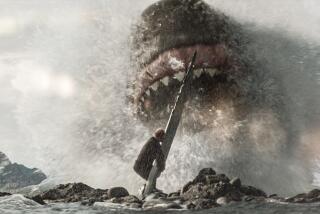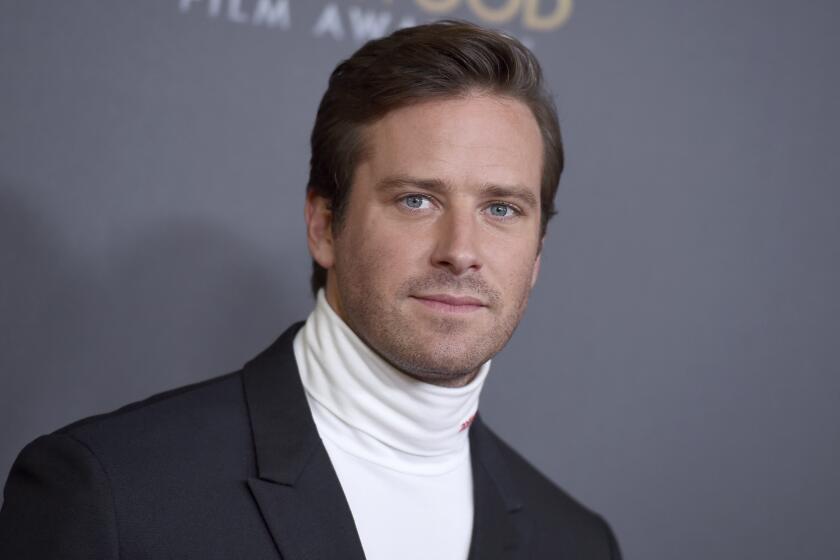‘New Hollywood’ in a nostalgic glow
BACK in 1971, Jack Nicholson made his feature directorial debut with the X-rated drama “Drive, He Said.” But don’t look for the film at your local store -- it hasn’t been released on DVD. Neither has Frank Perry’s 1970 drama, “Diary of a Mad Housewife,” even though star Carrie Snodgress received an Oscar nomination for best actress. It’s been years since “Housewife” has even aired on television.
They’re among the respected films from the “New Hollywood” era of the late 1960s and 1970s that have been overshadowed by the period’s big names, “The Godfather” epics, “The French Connection,” “The Graduate,” “Bonnie and Clyde” and others. But they’ll step onto the screen again in the American Cinematheque’s new retrospective, “Return to New Hollywood,” which kicks off Wednesday at the Egyptian Theatre.
Some of the films on the roster were ahead of their time and struggled at the box office some 30 years ago. But others were big hits in their day, and Cinematheque programmer Chris D isn’t really sure why they haven’t achieved the longevity of a “Godfather,” though he believes it could be the “subject matter or the approach” of the director.
Film historian Gary Prebula notes that “a lot of the stars didn’t go on to be superstars. In ‘Drive, He Said,’ there is no one of note that most people would know today. I think a lot of the actors in these movies aren’t going to sell video boxes.”
He also points to the explicit sex featured in the films. “One of the themes you see in these films is sex and drugs -- a lot of drugs. Looking at ‘Panic in Needle Park,’ it’s a tough film to sell to audiences today.”
Among the highlights of the festival are several films not available on DVD, such as Arthur Penn’s surreal 1965 comedy-drama “Mickey One,” which marked the first time the director worked with Warren Beatty; the 1970 drama “Puzzle of a Downfall Child,” directed by Jerry Schatzberg and starring Faye Dunaway as a troubled supermodel; and “Play It As It Lays,” Frank Perry’s depressing 1972 drama based on the book by Joan Didion, starring Tuesday Weld as an ex-model on the verge of a breakdown.
*
Of war and rebellion
SCREENING on the March 24 bill is the popular 1970 comedy “Getting Straight,” starring Elliott Gould as a Vietnam vet caught between the establishment and student protesters as he attempts to earn his master’s degree in English. Candice Bergen also stars, as his girlfriend.
Director Richard Rush, who helmed the 1980 dark comedy “The Stunt Man,” will be on hand to discuss the film.
Rush recalls he had a “great time” making films in the era of New Hollywood. “That was at the point where directors could still be considered auteurs and the studios hadn’t closed up the door and taken away final cut, so we were making our pictures.” Not only did Hollywood see an influx of new young directors, writers and actors, he says, but “there was a loosening of censorship -- not values but morals. The loosening of morals represented a tightening of values.”
Before “Getting Straight,” Rush had made only independent films such as 1968’s “Psych-Out.” “I was one of the big fish in the very little pond of exploitation pictures,” he says. “My agent felt they might be able to get me a studio picture. They went to Columbia and set up a meeting for me. Columbia liked the idea because my grosses had been good. I seemed to be fiscally responsible.”
The studio offered Rush a couple of pictures, including a book called “Getting Straight.” “It was about a college student who was trying to get through the academic barriers without losing his sense of self,” he says. “It seemed like an interesting story.”
He decided it would be even more interesting if he set it against a contemporary social backdrop. “I had grown up with a strong social conscience,” he says. “I was always aware of what the culture was doing and thinking in terms of the pictures I wanted to make. I was dying to do a picture about the hippie culture and as it turned cold that one winter because the Vietnam War had focused everything and ‘make love not war’ turned into campus rebellion. It seemed like that was the culture at the time. I took the story of an aspiring college professor and student and turned it into a campus rebellion.”
Rush said he expected the film to be well received, “but I was surprised that we opened on the day of the Kent State massacre -- which was not the best moment to do a comedy about college rebellion -- survived and caught on.”
He admits that it’s probably his fault that “Getting Straight” hasn’t been released on video or DVD. “I haven’t bugged the studio to do it,” he says. “They are so busy being involved in the process of climbing the corporate ladder. It is different than it used to be. It has much more to do with ego now than with greed. If it’s not something that was invented here, they are less interested. Meaning if they don’t get the creative credit for it, there is nobody inspired to pick it up.”
*
‘Return to New Hollywood’
Where: Egyptian Theatre, American Cinematheque, 6712 Hollywood Blvd., Hollywood
When: Wednesday to March 25
Price: $6 to $9
Contact: (323) 466-FILM or go to www.americancinematheque.com
Schedule
Wednesday: “Puzzle of a Downfall Child,” “Loving,” 7:30 p.m. Friday: “Play It As It Lays,” “The Swimmer,” 7:30 p.m. Saturday: “Diary of a Mad Housewife,” “Ladybug, Ladybug,” 7:30 p.m.
Next Sunday: “Fat City,” “Panic in Needle Park,”
6:30 p.m.
March 22: “Point Blank,” “Prime Cut,” 7:30 p.m. March 23: “Night Moves,” “Mickey One,” 7:30 p.m.
March 24: “Getting Straight,” “Drive, He Said,” 7:30 p.m. March 25: “End of the Road,” “The Liberation of L.B. Jones,” 7:30 p.m.
More to Read
Only good movies
Get the Indie Focus newsletter, Mark Olsen's weekly guide to the world of cinema.
You may occasionally receive promotional content from the Los Angeles Times.








